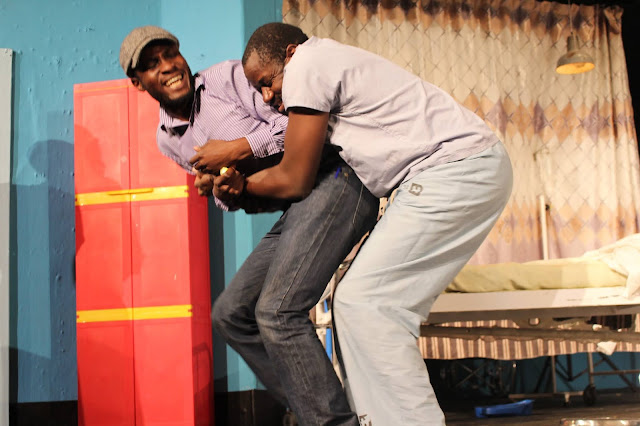BACK TO BASICS’ COMEBACK WITH DISTURBING DRAMA
By Margaretta wa Gacheru (posted 15 November 2021)Back to
Basics has got to be one of the most edgy and experimental theatre companies in
Kenya. That is why we had such high expectations of their return to the stage
earlier this month. Needless to say, some B2B fans were stymied to find the
Jain Bhavan Temple where ‘Breathe III’ was happening, but the public persevered
and fans came out in record numbers.
As with the
performances of Breathe I and Breathe II, Mbeki Mwalimu assembled a series of quirky
true Kenyan stories, collected and narrated by journalist Jackson Biko, to
create Breathe III. Mbeki both curated the stories and directed the show.
Presented as
a series of animated monologues, B3 generally focused on relationships, mostly
unsatisfactory ones between women and men.
Nick Ndeda hugged by Gilbert Lukalia in previous B2B production.
Yet one of the most engaging tales of the five who are traveling by train from Nairobi to Mombasa, is about a guy struggling to stay alive in the slum. Brio, according to Nick Ndeda, didn’t have a problem with women. His primary concern was surviving in light of the poverty and violence he incurred on a daily basis in Kibera. Ndeda, like the other four storytellers, went into graphic detail about gritty struggles that made their stories so incredible.What made
Ndeda’s Brio such a compelling character is not just Biko’s depiction of the
risky business of Brio’s not getting raped, robbed, or killed every day in the
slum. It’s the way Ndeda grabbed his character and got physical with his
portrayal of this boy who eventually would become a prize-winning boxer.
It's the one
happy ending in the show. The rest are bitter-sweet affairs, except in the end
when Nick and Martin Githinji stand up to try to defend men in light of the
tales told by three powerful women actors who have deep grievances with men,
starting with Mary Mwikali.
Mwikali
gives us some of the lighter moments of the show, especially when she asserts
her own agency in admitting she’d been shamelessly addicted to sex for three
years! She tells her story to total strangers who, like us, are fully swept up
in her charismatic portrayal of a woman daring to overthrow her frustrations
with men by taking charge of her relationships and thus her life. Mwikali’s capacity
for making us laugh and cry with her character is one of the gifts of Breathe 3.
Unfortunately,
Shazmeen Bank’s character has been wounded so deeply by her man that she can
only express herself as a victim of her spouse’s alcoholism, womanizing, and psychological
abuse. Unlike Mwikali’s character, she’s wholly oppressed by her spouse, thus
making her piece the most painful in the show. Her latent rage comes pouring
out as the train passengers slept. Apparently, hers is an internal monologue
drafted in a letter she had written to the guy. Ultimately, her reality is that
she’s stuck in a rut like so many married wives, seething with silent rage, who
suffer in silence and can’t find their way out of their victimhood.
In yet
another contrast, Wakio Ndenge’s character is a fighter whom we initially meet,
not in the train but in front of the main stage curtain, musing on her miseries.
The train has evaporated from the scene, so this is the most surreal episode. Domestic
violence is again a theme running through her tale, but it’s preceded by her thinking
about an abortion she has had and the feelings of guilt and low self-esteem
that followed that decision. It isn’t quite clear why her man shows up at that
moment, but she and Ndeda get into both a verbal and a physical brawl that looks
deadly. Fortunately, she survives but the message is plain: women have major
problems with men.
Yet once we
get back to the train, it’s as if nothing had happened the whole night. All three
women disembark while only Ndeda and Martin Githinji are left to a quasi-rap
rendition of what makes a man. They’re made to look slightly absurd as a
defense of the male, especially after all we have heard. But the tragicomic
tone of their dialogue tops off a tale that paints an unhappy portrait of not
just spousal relations. We also detect a broader, unsettled undercurrent in
Kenyan society. It’s sadly polluted with violence, injustice, and impunity
which has seeped into the deeper dimensions of people’s personal lives.
Breathe 3 was
a painfully disturbing show to watch but it’s also a provocative one,
poignantly told by a team of some of Nairobi’s most talented actors.



No comments:
Post a Comment